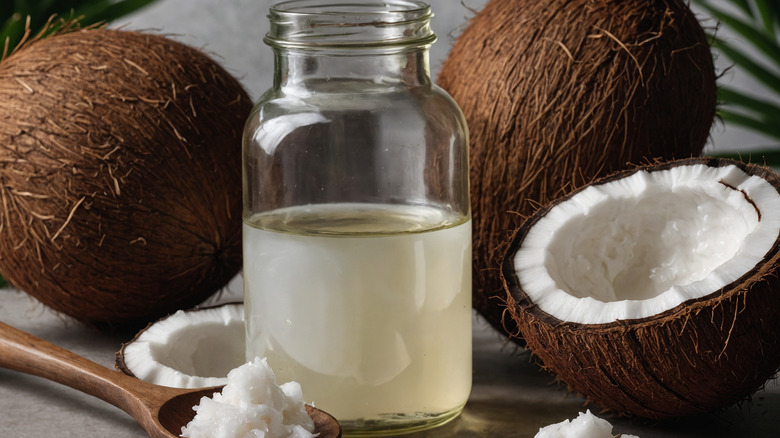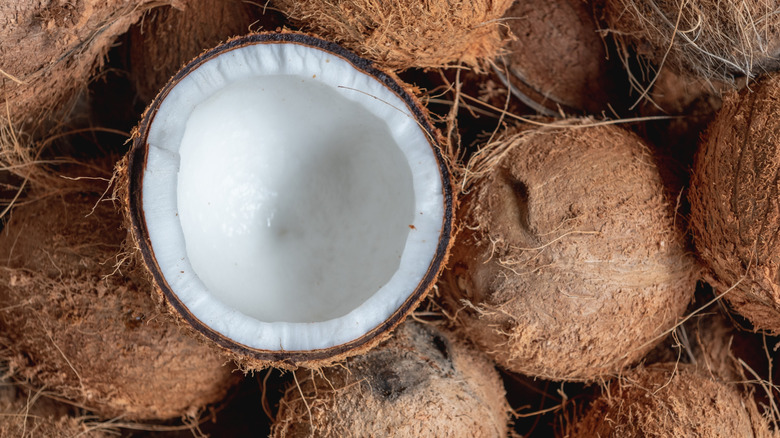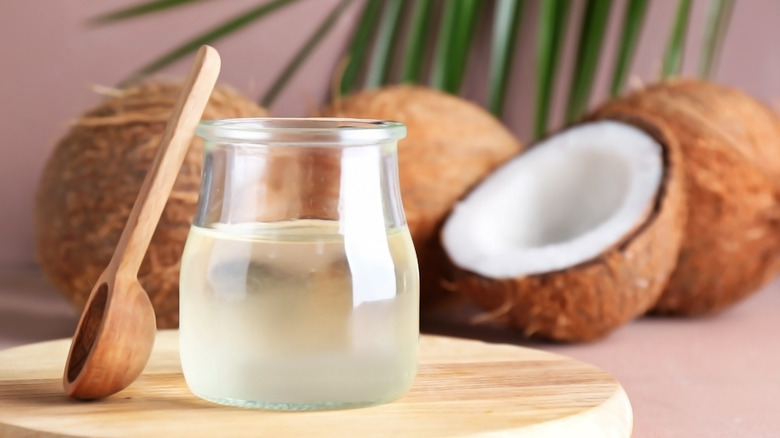Virgin Vs Refined Coconut Oil: What's The Difference?
Coconut oil is a versatile beast in the kitchen. It can be used to add flavor to recipes, but also as an oil to cook in, or as a substitute for oil or butter in baking. But if you've gone to the store for coconut oil, you might have been confronted with a variety of descriptors on jars that aren't very well explained. The most common labels to find are "refined," "unrefined," "virgin," and "extra virgin." So, what's the difference and what can you use for what?
Some of these terms for coconut oil can be done away with off the bat. When it comes to labeling a jar of coconut oil "extra virgin" doesn't mean anything different from "virgin." The terms might seem familiar from olive oil bottles, but in that industry what can be labeled as "extra virgin" is strictly controlled and regulated. The same is not true for coconut oil. So, while within a brand there might be a distinction between one labeled as "virgin" and one labeled as "extra virgin," across brands it doesn't mean anything and is just a way to sell coconut oil. Similarly, unrefined is just another name for virgin coconut oil which sounds slightly less appealing. Really, it comes down to the difference between virgin coconut oil, which is pressed and then largely left alone for a flavorful oil with a low smoke point, and refined coconut oil, which is pressed and then treated for an oil with a higher smoke point.
What virgin coconut oil means
Virgin or unrefined coconut oil is the name given to the end product from a particular process. There are two versions of this process: one wet and one dry. For each method, to produce virgin coconut oil, the manufacturing process begins with fresh coconut flesh. For the dry version, the coconut flesh is heated to remove excess moisture, and the dry coconut is then put into a press and the oil is squeezed out of it. That is the full extent of the process for dry pressed virgin coconut oil. The wet version is more complicated as the coconut flesh is pressed along with all of its fluids intact. The result is a mix of coconut milk and coconut oil that needs to be separated by running the solution through a centrifuge.
The result of all of this is virgin coconut oil. Processed in this way, the coconut oil has a relatively low smoke point of just 350 degrees Fahrenheit, similar to sesame oil, extra virgin olive oil, and butter. Kept in a sealed jar and out of the light, virgin coconut oil can keep for as long as three years.
The only other thing you might want to look for on a jar of coconut oil is how it is pressed. Many will have been "expeller pressed." This means it was run through a press in which heat is applied to aid the extraction. Alternatively, it might be marked as "cold pressed." The process is the same, but as the name suggests it is done without additional heat, which means the original nutrient content of the coconut is less affected by the process.
What you need to know about refined coconut oil
While virgin coconut oil begins with fresh coconut, refined coconut oil always starts with dried coconut flesh, which is called copra. Some water is added back in to rehydrate the copra enough to be able to be pressed, and then the oil is squeezed out in a similar process to the one for dry pressed virgin coconut oil. However, the refined coconut oil then goes through further processes to make it fully refined. The oil is heated with steam to remove the odor, filtered for impurities, and then is passed through a bleaching clay.
The refined coconut oil that comes out of this is surprisingly different from the virgin coconut oil. Refined coconut oil is mostly flavorless and odorless. But it also has a much higher smoke point, between 400 and 450 degrees Fahrenheit, more comparable to canola oil, vegetable oil, or peanut oil. The shelf life for refined coconut oil is much shorter and might only last 2-3 months once opened.
Which coconut oil to use for different cooking applications
Both virgin and refined coconut oil have their strengths when it comes to cooking. Which one you choose is going to come down to that smoke point and whether you are looking for that coconut flavor. If you're going to be frying anything in coconut oil, it's probably best to reach for the refined coconut oil to avoid getting an acrid burnt taste in whatever you're cooking, not to mention a smokey kitchen.
If you're baking and substituting coconut oil for the fat in a recipe, then which one you use shouldn't matter too much on a chemical level. Refined coconut oil will work perfectly well as a substitute in most baking recipes and shouldn't affect the flavor in a noticeable way. Virgin coconut oil will work in the same way, but you can look forward to a hint of coconut in what you're cooking which, if it's by design, can be delightful.



